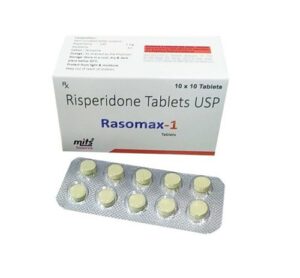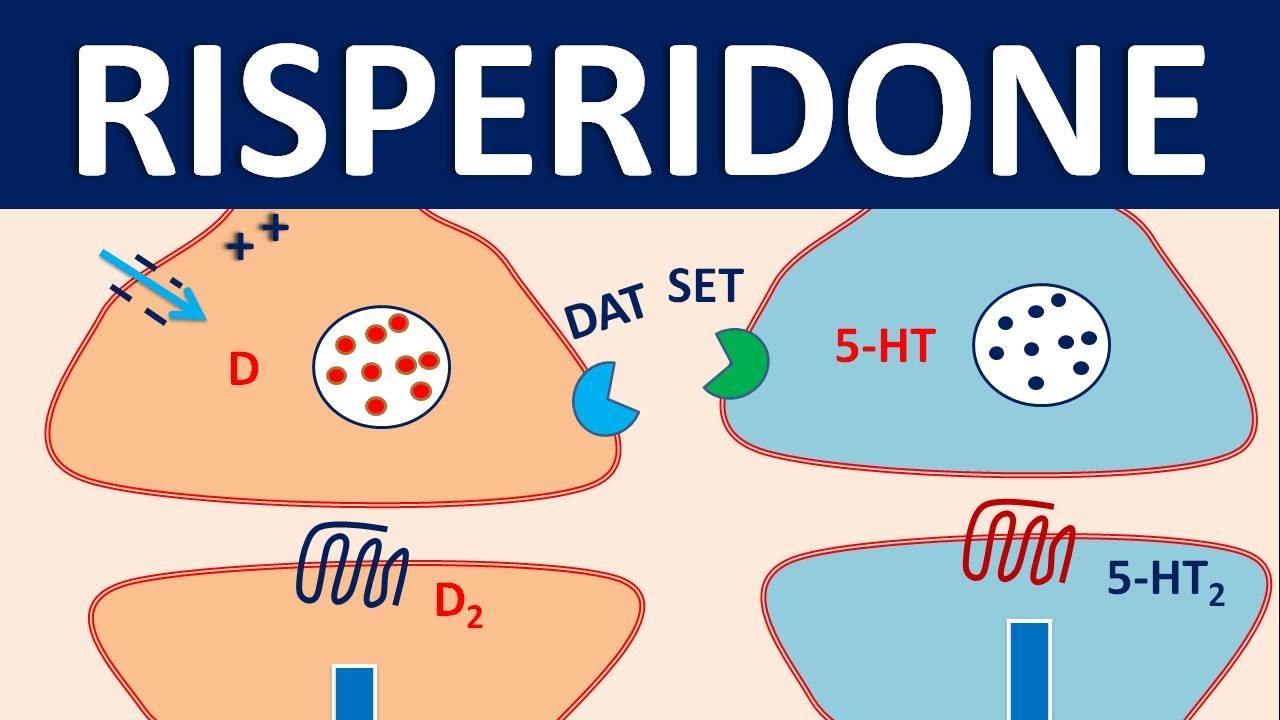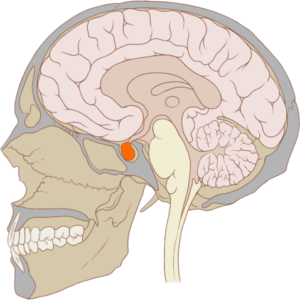Risperidone is a medication that has been approved by the FDA for the treatment of schizophrenia and bipolar disorder. It can also help in controlling symptoms in people with autism, as well as Tourette syndrome and hyperactivity. One thing you may not know about risperidone long-term side effects. It can cause these if taken over an extended period of time. This article will discuss these potential long-term risks so you can make an informed decision before starting treatment with this drug.
Contents
What Is Risperidone?
 Risperidone is a medication that can help to treat mental illness. It belongs to a class of medications called atypical antipsychotics, and it works by changing the actions of certain chemicals in the brain. Risperidone can be helpful for people with schizophrenia, bipolar disorder, or autism spectrum disorder. This medication has also been found to be particularly effective in treating irritability associated with autism.
Risperidone is a medication that can help to treat mental illness. It belongs to a class of medications called atypical antipsychotics, and it works by changing the actions of certain chemicals in the brain. Risperidone can be helpful for people with schizophrenia, bipolar disorder, or autism spectrum disorder. This medication has also been found to be particularly effective in treating irritability associated with autism.
This medication comes in tablet form and is taken once a day, either with or without food. When the medication was first released onto the market back in 1996 it came as an oral solution that had to be mixed together by a pharmacist prior to use. In 2006 risperidone became available as a non-liquid formulation which allowed for easier dosing options such as being able to split tablets into smaller doses for those who have difficulty swallowing large pills whole.
How To Take Risperidone?
Risperidone is typically taken once daily at bedtime by mouth as directed by your healthcare provider. The tablet should be placed under the tongue until it dissolves completely before being swallowed with water every time you take it. Your specific dose will depend on your medical condition and response to treatment. If you are prescribed a liquid form of risperidone, it will be mixed by a pharmacist just before use.
How Does Risperidone Work?

This medication works by changing the actions of certain chemicals in the brain. It belongs to a class of medications called atypical antipsychotics, which means that it works differently than other medications used to treat mental illness.
After this medication is swallowed, it travels through the digestive system and enters the bloodstream. From there, it is carried to the brain where it attaches to specific sites called receptors. This attachment blocks or inhibits the action of some natural chemicals in the brain that may be causing symptoms of mental illness.
Is It Effective?
According to studies, risperidone is effective in treating symptoms of schizophrenia, bipolar disorder, and an autism spectrum disorder. It is also particularly effective in treating irritability associated with autism.
There are currently no conclusive research studies that can prove just how effective this medication is in treating depression. However, this can also be helpful for people with bipolar disorder and schizophrenia who also suffer from symptoms of depression or anxiety.
Benefits of Risperidone
There are many benefits of using risperidone. Some of these are:
- helps to improve mood, sleep patterns, and interests in activities
- reduces hallucinations (seeing or hearing things that aren’t really there)
- decreases the number of times you feel agitated or manic
- improves social function
- reduces hostility and suspiciousness
- lowers the risk of suicidal behavior
- may help with negative symptoms like lack of pleasure in life.
- lower your chances of having a relapse.
- decrease how often you have psychotic episodes.
- Risperidone can help to stabilize moods in people with bipolar disorder.
- It can also help to reduce symptoms of schizophrenia.
- Risperidone has been shown to be effective in treating irritability and aggression caused by autism, as well.
- Risperidone can help to reduce impulsivity and improve social function in children with ADHD (attention deficit hyperactivity disorder).
- It has also been shown to be beneficial for treating agitation or disruptive behavior of people who have dementia or Alzheimer’s disease.
What Are Risperidone Long-Term Side Effects?
There are a few side effects to consider when taking this medication:
Drowsiness
 This side-effect is usually temporary and often decreases as the body becomes adjusted to this medication.
This side-effect is usually temporary and often decreases as the body becomes adjusted to this medication.
Weight Gain
It is important for a person taking risperidone to maintain an exercise regimen or make dietary changes in order to prevent weight gain. You can prevent weight gain by doing physical activity and reducing calorie intake.
Prolactinoma
 This side effect occurs when there is an increase in prolactin hormone levels. This occurs mostly with regular use over time (the condition will go away if you stop the treatment). It may lead to sexual dysfunction, decreased sex drive, breast milk production not stopping after childbirth/nursing, trouble getting pregnant, enlarged breasts in men called gynecomastia, menstrual period stopping before age 12 or 14 years old; possible long-term loss of bone mineral density.
This side effect occurs when there is an increase in prolactin hormone levels. This occurs mostly with regular use over time (the condition will go away if you stop the treatment). It may lead to sexual dysfunction, decreased sex drive, breast milk production not stopping after childbirth/nursing, trouble getting pregnant, enlarged breasts in men called gynecomastia, menstrual period stopping before age 12 or 14 years old; possible long-term loss of bone mineral density.
Changes In Blood Sugar Levels
This side-effect is often temporary and will go away as the body adjusts.
Risperidone can cause high blood sugar levels, especially if you take it with certain medications or herbal supplements that contain hypericum perforatum. It may also increase the risk of diabetes for people who already have diabetes, so monitoring blood sugars carefully is important when taking this medication.
Rashes Or Hives
This side effect is rare, but it can occur. If a person experiences a rash or hives while taking this medication, they should stop taking the medication and contact their doctor.
Muscle Stiffness
This side effect is because risperidone can block a chemical in the brain called acetylcholine.
Tardive Dyskinesia
 This side effect is rare, but it may occur over time with regular use of risperidone. Tardive dyskinesia is a condition that causes involuntary movements, most often in the face (e.g., lip-smacking, puckering up to one’s mouth). If a person experiences this side effect, they should contact their doctor immediately.
This side effect is rare, but it may occur over time with regular use of risperidone. Tardive dyskinesia is a condition that causes involuntary movements, most often in the face (e.g., lip-smacking, puckering up to one’s mouth). If a person experiences this side effect, they should contact their doctor immediately.
How To Manage Risperidone Long-Term Side Effects?

There are some methods a person can use to manage the side effects of risperidone:
Try To Avoid Taking Medications Late
You should avoid taking medications late in the evening because this may cause drowsiness.
Take Risperidone At Same Time Every Day
Taking risperidone at around the same time every day can help to prevent some of its side effects, such as dizziness and sleepiness. You should take risperidone at the same time every day, even on days when you don’t feel like it.
Increase Physical Activity Or Make Dietary Changes
If a person is not exercising or eating healthy foods then they should increase physical activity and/or make dietary changes to help prevent weight gain while taking this medication. Exercise can also help them avoid feeling drowsy during the day (which may cause accidents).
Reduce Calorie Intake
A person who gains too much weight over time due to treatment with risperidone may have their calorie intake reduced by their doctor in order to lose some of that weight. Your doctor will help you to create a plan that is best for you.
Monitor Blood Sugar Levels
If a person has diabetes or is at risk for developing diabetes, they should monitor their blood sugar levels closely while taking risperidone. This medication can cause high blood sugar levels in some people.
Reduce Alcohol Consumption
If a person is taking risperidone, they should avoid or limit their alcohol intake because it could increase sedative (sleep) side-effects.
Be Aware Of Your Health Symptoms
Some symptoms that you can experience while taking this medication include anxiety; blurred vision; changes in appetite; changes in sex drive; constipation; difficulty getting or keeping an erection (in men); drowsiness/sleepiness; dry mouth; fatigue, fever, and chills.
Conclusion
In conclusion, there are some potential long-term side effects that a person should be aware of before starting treatment with risperidone. However, if you know how to manage these side effects correctly, you can avoid these negative impacts. It is important to talk to your doctor about any concerns you may have and to follow their advice closely.
If you are looking for affordable Online Counseling MantraCare can help: Book a trial therapy session


